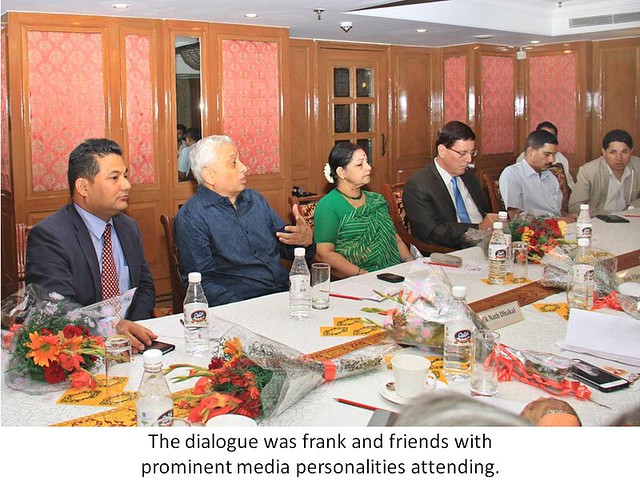New Delhi, India— UPF organized a meeting on October 4 to express concern over and propose solutions to the deterioration of bilateral relations between India and Nepal.
Up to and following the promulgation of Nepal’s new Constitution on September 20, 2015 protests by ethnic minorities in Nepal’s southern plains that border India resulted in more than 50 people being killed, including senior police officers. Transportation of vital goods to Nepal, a landlocked nation, has been at a virtual standstill for more than a month.
The goal of the meeting was to have open, frank and face-to-face dialogue focusing on ways to restore relationships to their traditional levels of mutual trust, friendship and cooperation. Participants agreed that it was in the interest of all parties to strengthen Nepal’s efforts to ensure a strong, stable and inclusive federal democratic structure.
The interaction meeting entitled, “Recent Developments in Nepal and India-Nepal Relations: The Way Forward,” was chaired by former Indian Ambassador to Nepal, K.V. Rajan, and addressed by Hon. Ek Nath Dhakal, chair of UPF-Nepal and former minister and member of the Constituent Assembly of Nepal. Government leaders, diplomats, scholars, and media were among those who participated in the meeting.
Hon. Dhakal presented an analysis, from the perspective of Nepal, on the consultations that led up to the creation of the new constitution. He noted the constitution is progressive, inclusive and flexible so that the demands of the protesters could be accommodated. Hon. Dkahal also spoke of Nepal’s disappointment and concern by India’s reluctance to welcome the landmark document—despite it being recognized by the UN and many other governments, as well as the impact the disruption of cross-border movement of goods has had on Nepal’s economy. The Nepalese MP concluded by saying that India’s unequivocal recognition of Nepal’s constitution would go a long way in reducing tensions and restoring cordial relations between Kathmandu and Delhi.
Political leaders, including Mr. Vijay Jolly, a member of the National Executive of India’s ruling party, the BJP (Bharatiya Janata Party), and Mr. Mani Shankar Aiyar, a member of India’s parliament, offered different views on India’s approach, respectively endorsing and opposing the government’s approach. Prof. Mahendra Lama of Indira Gandhi National Open University (IGNOU); Mr. G.M. Gurung, chair of UPF-Sikkim and minister of cultural affairs for Sikkim state; and former Indian Ambassador, Ashok Sajjanhar, suggested steps could be taken, through special mechanisms, to restore cross border traffic while Nepal’s political parties find ways to ensure maximum support for the constitution, including by amending it.
Earlier, Dr. Robert Kittel, director of education of UPF-Asia, briefed the meeting about the South Asia Peace Initiative and the series of conferences it has held over the past decade. Through it, UPF-Nepal made a notable contribution to the success of the peace process in the country, which culminated in the mainstreaming of the Maoists as a political party into a democratic structure, the integration of the Maoist army with the Nepalese forces and, recently, the creation of the new constitution.
Participants agreed that the promulgation of the constitution by an overwhelming majority of the Constituent Assembly members was a significant achievement that deserves to be hailed as such by all friends of Nepal. India’s generous support to strengthen Nepal’s stability and economy and the institutional capacity of its new, inclusive democratic federal structure would be invaluable, available and fully utilized as Nepal overcomes the challenges ahead.
The meeting was called to order by Mr. Krishna Adhikari, secretary general of UPF-India. Mr. Santosh Paudel, vice chair of UPF-Nepal and spokesperson for the Nepal Family Party, pointed out that an inaccurate and incomplete understanding of Nepal’s situation lies at the root of the current impasse.

